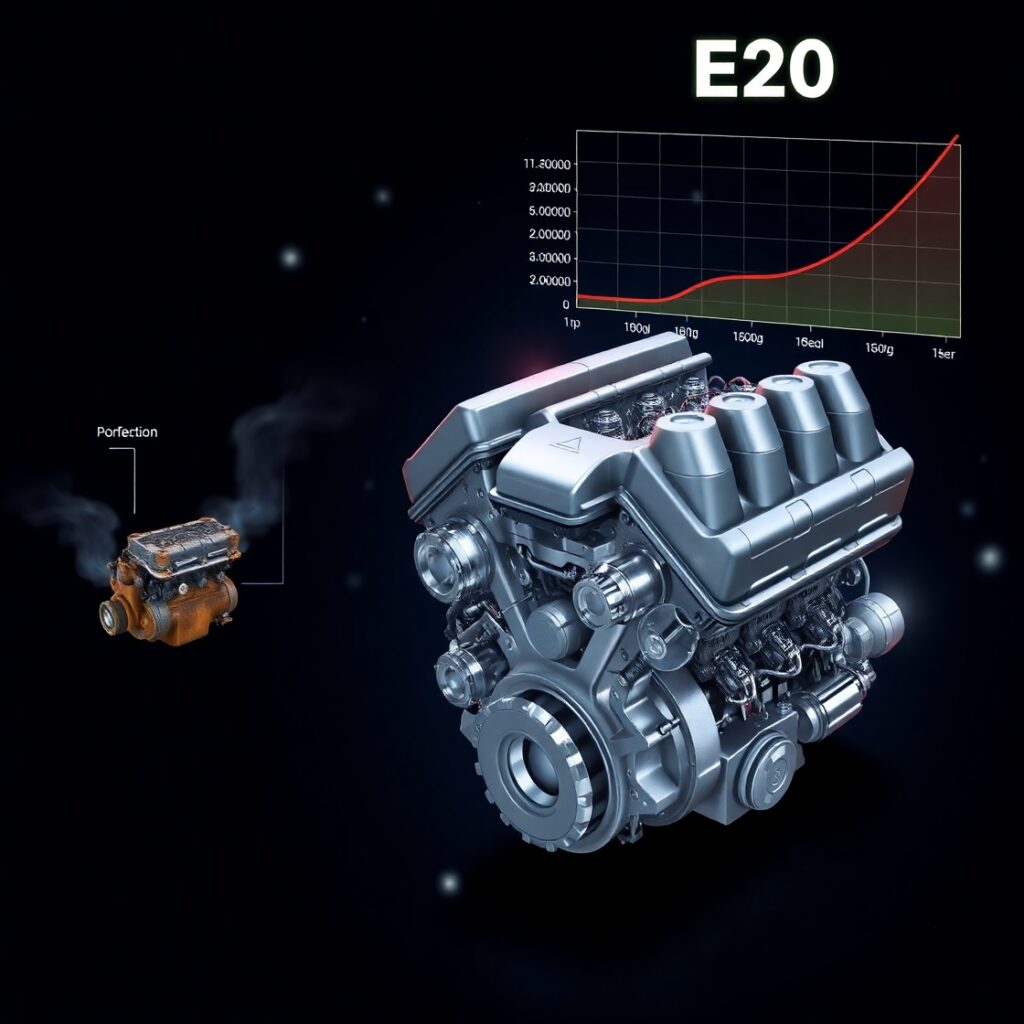What is E20 Fuel? Benefits, Effects on Engines, and How Biofuel Supports India’s Growth
The world is increasingly turning to sustainable energy solutions as part of its efforts to combat climate change and reduce dependence on fossil fuels. Among these solutions, biofuels are gaining significant attention. In India, one such biofuel making waves is E20 fuel, which is a blend of 20% ethanol and 80% gasoline. As the Indian government pushes for greater adoption of ethanol-blended fuels, the adoption of E20 fuel is expected to grow rapidly. This blog will explore what E20 fuel is, its benefits, the effects it has on engines, and how biofuels like E20 contribute to India’s economic and environmental growth.
Unistar, a leading player in the energy and fuel solutions industry, is committed to helping India transition to biofuels like E20. Let’s dive into the details of this promising fuel and its potential impact.
What is E20 Fuel?
E20 fuel is a type of ethanol-blended fuel consisting of 20% ethanol and 80% gasoline. Ethanol is a renewable biofuel made from plant-based materials such as sugarcane, maize, or even agricultural waste. It is produced through a process called fermentation, where plant sugars are converted into ethanol. When blended with gasoline, ethanol reduces the carbon content of the fuel, making it a cleaner, more sustainable alternative to traditional gasoline.
E20 fuel is part of a broader push to increase the percentage of ethanol in gasoline blends. India has already been using E10 fuel (10% ethanol, 90% gasoline) for a while, and the government has set a target to achieve E20 fuel usage across the country by 2025. This transition is aimed at improving India’s energy security, reducing greenhouse gas emissions, and boosting rural agricultural economies.
Effects of E20 Fuel on Engines
As with any new fuel type, there are concerns about how E20 fuel will affect engines. Ethanol, being a different chemical compound from gasoline, has certain characteristics that can impact vehicle engines. Below are some of the key effects of E20 fuel on engines:
1.Improved Engine Performance
Ethanol has a higher octane rating than gasoline, which means it can improve engine efficiency. Engines running on ethanol-blended fuels like E20 can handle higher compression ratios, leading to better engine performance, increased horsepower, and a smoother driving experience. The higher octane content helps prevent engine knocking, which improves fuel efficiency and extends engine life.
2.Compatibility with Older Engines
While E20 fuel is suitable for most modern engines, older vehicles or engines not designed for ethanol blends may face issues. Ethanol can be corrosive to certain engine components, including fuel lines, gaskets, and seals. Older vehicles may also struggle with a slight reduction in fuel efficiency because ethanol has a lower energy density than gasoline. However, many newer vehicles are specifically designed to handle ethanol blends, including E20.
Automakers and fuel solution providers like Unistar are working closely with manufacturers to ensure that future vehicles can operate smoothly with higher ethanol blends. As India transitions to E20 fuel, vehicle manufacturers will ensure that the next generation of engines is designed to be ethanol-compatible, preventing long-term damage.
3.Slight Reduction in Fuel Efficiency
While ethanol provides several benefits, it has a lower energy density than gasoline. This means that vehicles running on E20 fuel may experience a slight reduction in fuel efficiency compared to running on pure gasoline. However, the environmental benefits of reducing greenhouse gas emissions and the long-term economic advantages of energy independence outweigh this minor drawback.
Benefits of E20 Fuel
The move to adopt E20 fuel comes with several benefits that are crucial for India’s long-term sustainability goals. Here are the key advantages:
1.Reduction in Greenhouse Gas Emissions
One of the biggest environmental benefits of E20 fuel is its potential to reduce greenhouse gas emissions. Ethanol, when combusted, produces significantly fewer carbon emissions compared to gasoline. It helps to lower the emissions of harmful pollutants such as carbon dioxide (CO2), carbon monoxide (CO), and nitrogen oxides (NOx). As India continues to battle air pollution, especially in its urban centers, the adoption of E20 fuel can significantly improve air quality and reduce the harmful effects of fossil fuels.
2.Enhanced Energy Security
India’s dependence on crude oil imports is a pressing issue. As one of the world’s largest importers of crude oil, India faces risks related to price volatility, geopolitical tensions, and supply disruptions. By shifting to biofuels like E20, which are derived from locally available crops, India can reduce its reliance on foreign oil. This not only helps stabilize fuel prices but also ensures more energy independence, supporting long-term economic and national security goals.
The production of ethanol from crops like sugarcane and maize can be scaled up to meet rising demand, making it a more sustainable and reliable domestic fuel source.
3.Boosting the Agricultural Sector
India has a vast agricultural base, and biofuels like ethanol can provide much-needed support to the agricultural sector. By increasing the demand for ethanol, there is a natural incentive for farmers to produce crops like sugarcane, corn, and other biofuel feedstocks. This creates a new revenue stream for farmers, which helps improve their incomes and promotes agricultural diversification.
In rural areas, where agriculture remains the primary livelihood, the growth of the biofuels industry can lead to better infrastructure, more stable income levels for farmers, and the creation of new jobs in biofuel production and distribution.
4.Economic Growth and Job Creation
The shift towards biofuels like E20 fuel will lead to substantial job creation across India. This includes employment in agriculture, biofuel production, and fuel distribution sectors. As the demand for biofuels increases, new industries will emerge, creating thousands of jobs, especially in rural and semi-urban areas. Additionally, this transition will create new business opportunities in the manufacturing of biofuel-compatible vehicles, infrastructure for fuel storage, and the development of the necessary technology.
These developments will contribute to overall economic growth, especially in areas that rely heavily on agriculture and have fewer industrial job opportunities. It will also open the door for further research and innovation in the renewable energy sector.
How Biofuels Support India’s Growth
India is a country of immense potential, and biofuels like E20 fuel play a critical role in supporting its sustainable development. Here’s how biofuels are directly contributing to India’s growth:
1.Energy Security and Independence
India’s energy import bill is a significant burden on its economy. By increasing the domestic production of biofuels, India can reduce its dependency on fossil fuels and build a more resilient energy system. The government’s focus on ethanol production for E20 fuel is helping to promote energy security and reduce the financial strain caused by fuel imports.
2.Environmental Sustainability
India is struggling with severe air pollution in major cities, largely due to the burning of fossil fuels. By shifting to E20 fuel, which is a cleaner-burning alternative, the country can dramatically reduce its carbon footprint. The use of E20 will contribute to improving air quality, reducing smog, and helping to meet India’s climate goals.
3.Economic Growth and Rural Development
Biofuels create opportunities in agriculture, manufacturing, and services, especially in rural areas where agricultural production is a primary source of livelihood. The biofuels industry has the potential to generate millions of new jobs, making significant contributions to rural economic development and helping to lift people out of poverty.
Conclusion
The transition to E20 fuel is a critical step in India’s move towards a sustainable energy future. The environmental, economic, and social benefits of adopting E20 fuel are immense. By blending 20% ethanol with gasoline, India can reduce greenhouse gas emissions, enhance energy security, support the agricultural sector, and create jobs across rural and urban areas.
Enquire Now
Recent Posts
- What is Wet and Dry Waste?
- Top 10 Water Treatment Plant Manufacturers in India
- What Is an Industrial RO Plant And How Does It Work?
- LPH in RO Water Purifier
- What is Activated Sludge Process?
- Normal TDS Level in Drinking Water
- Difference Between Effluent and Sewage Treatment Plants
- What is E20 Gasoline
- What is E20 Fuel? Benefits, Effects on Engines, and How Biofuel Supports India’s Growth
- What is Transmembrane Pressure (TMP)?


